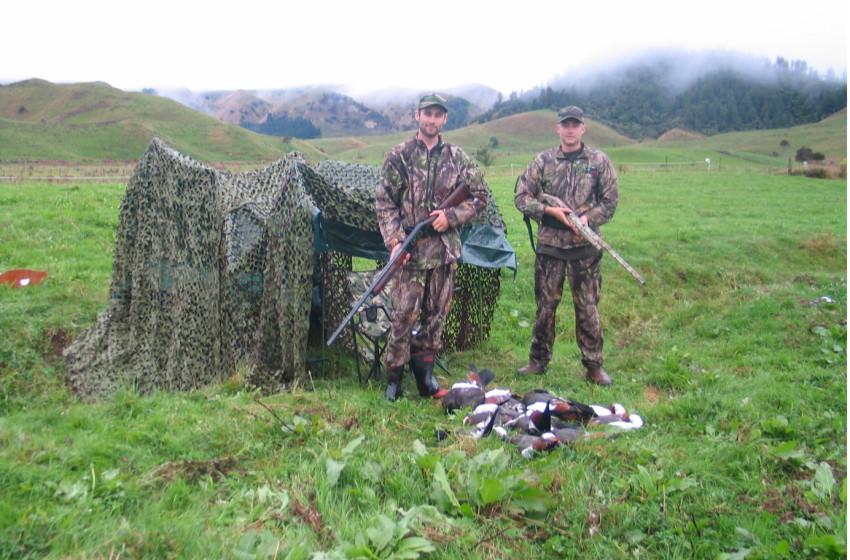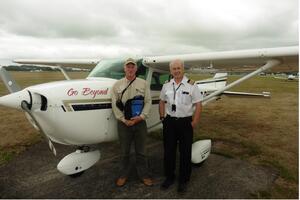Both Barrels July 2023 - Auckland/Waikato
- Auckland/Waikato
- 17/07/2023

Above Right: Improvised blinds and camo helped these two successful hunters.
This is the last Both Barrels for 2023.
That seems like a great time to mention the forthcoming Special Paradise Shelduck Season north of the Auckland Harbour Bridge; 17 & 18 of February, 2024, limit 15 per hunter, per day.
You can also hunt pukeko that weekend, limit 10 per hunter, per day, which might be a great time to offer the farmer help to protect his maize paddocks from pukeko damage.
Most landowners are only too happy to let hunters on to disperse paradise shelduck.
These hunts are a good way to introduce new shooters.
Old shooters too, who may have mobility issues, can often be driven right up to the hide, while the decoys are put out nearby in the paddock that the parries have been using.
If you put the birds off their favoured spot, they often return, especially if there are other hunters in the area to keep them moving – or send someone to find them, get a few shots off and send the rest back.
Parries aren’t too difficult to hunt and equipment needn’t be expensive.
A camo net is handy against a fence and/or supported by stakes and cable ties.
Some hunters now use collapsible camo-blinds or layout blinds in fields.
But often there are weeds, brush or even a drain, stream bank or similar feature, to hide in or behind.
Silhouette decoys, hand-made from plywood or purchased, are useful and full-bodied decoy shells have their advocates also.
Some shell types move in the wind and movement and/or a parry call will often get a passing bird’s attention.
Nothing beats being where they have already been feeding and in years past a single full-bodied, hand-painted decoy in the right spot was all it took.
As birds get added to the bag, it’s an idea to lay them out to simulate more decoys. Be sure to point their heads into the wind.
If the birds are getting hot, hang the fatter ones in the shade of a tree, with lots of air circulating around each of them, (not piled in a hot heap), to protect their meat.
Later on, keep meat in vehicles in the shade and/or a chilli-bin of ice too.
If you are hunting near a home-kill processor, they can take them off you and a few days later, you can go back and collect them as sausages or salamis.
Or you may need to chill the meat until they reopen on Monday.
Parries should taste nearly as good as mallard, but probably not if they’ve been left in the sun all day.
Young parries tend to be the ones in pre-breeder flocks while older birds are usually paired up on territories.
Hunt the flocks for the best-tasting young birds and the hottest action.

Safety glasses are cheap eye insurance in group hunts.
If shooting in a group of hunters, a very useful safety strategy is a good set of shooting glasses in case pellets are flying or ricocheting around, (off water, off land and even off hard bird bones in the air).
These glasses needn’t be expensive so long as they meet ANSI standard Z87.1+ or similar, (Z87+ means that the eyewear meets a higher impact standard and goes through a much tougher set of tests than Z87).
Smith & Wesson makes a useful product range in this regard.
You generally don’t need magnum loads or pellets for parries even though they’re a somewhat larger bird.
Paradise shelduck are a native species found only in NZ.
Fish & Game carefully monitor them to prevent over-harvest as they typically only breed in their second or even third year, (mallards and greys breed in their first year).

Fish & Game use very experienced pilots to do low-altitude annual aerial surveys of several waterfowl species.
Shortly before the season, we do annual aerial surveys to monitor their numbers, (we also monitor Canada geese and black swans).
In the not-too-distant past, we have also banded parries by the thousands.
This has all helped in our understanding of this species to ensure our sport is entirely self-sustaining for generations to come.
Bands

If you have any unreported duck or swan bands, send the details, (but not the band), in today, (Freephone 0800 BIRD BAND or send in your band details ).
You have until the end of this game bird season in August to report them to be in to win prizes this year.
If this deadline passes, you can report them next year but be very sure to tell us they’re this year’s bands, (or indeed last year's!).
Don’t fudge it to cover up being late.
It won’t change your eligibility, but it will stuff up our database.
If not sure how old your bands are, that’s fine.
Just tell us and we’ll allow for that.
If you have a band you’ve reported and another one you haven’t, but can’t now recall which is which, we can pull up the old record and work that out too. The sooner you send in a band, the less likely it’ll get lost, mixed up or forgotten.
Thank you to all hunters that took the trouble to send in bands to help our sport.
Good luck in the prize draw.
John Dyer
Auckland Waikato Fish and Game Officer.